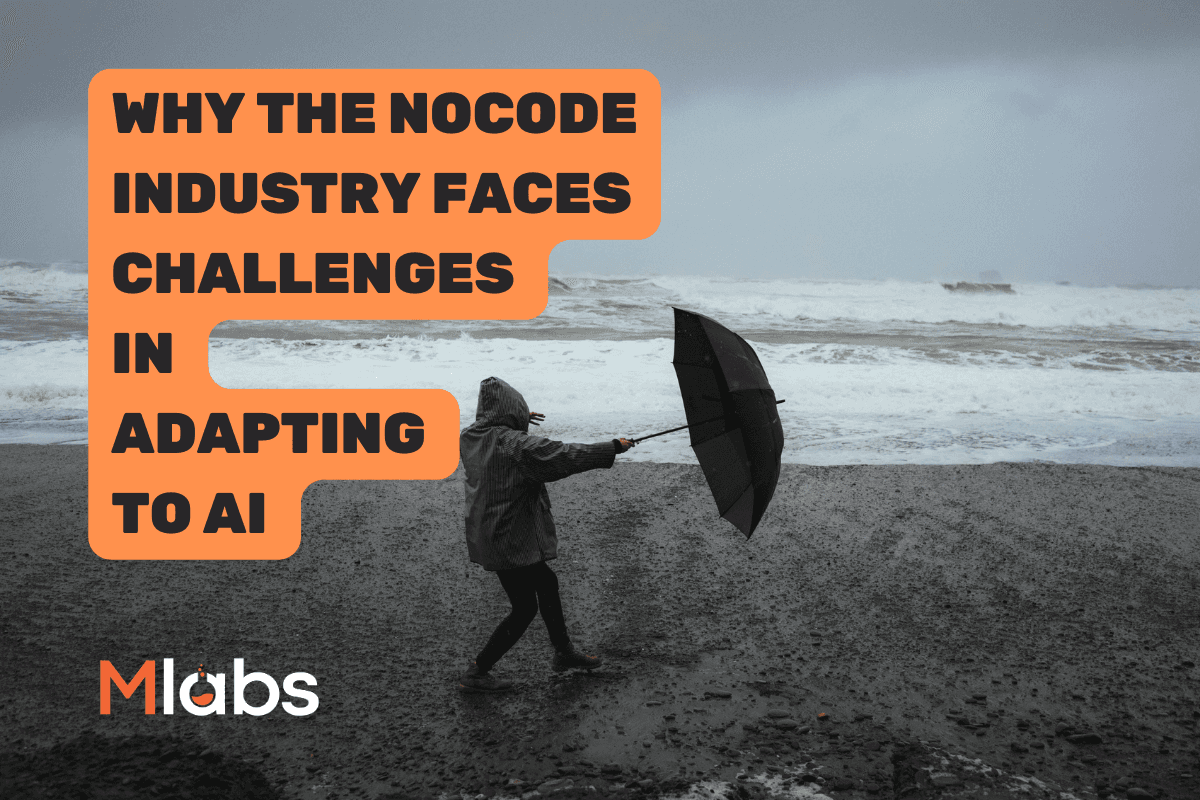
Simon Jenner
Friday 6 October 2023

The winds of technological change blow in the direction of artificial intelligence (AI), the NoCode industry finds itself on precarious grounds. Here’s why
Posted in:
No-Code
The rise of NoCode platforms over the past decade has democratized software development and enabled countless individuals and businesses to craft intricate digital solutions without any formal coding background. However, as the winds of technological change blow in the direction of artificial intelligence (AI), the NoCode industry finds itself on precarious grounds. Here’s why:
1. Non-native AI Architectures:
All leading NoCode tools that we see today started their journeys in the last 10 years. These platforms, though revolutionary in bridging the gap between coding and non-coding users, have one crucial limitation: they weren’t built with AI-first architectures.
When AI is artificially bolted onto these platforms, it's akin to trying to retrofit an old car with a modern electric engine. The marriage isn’t seamless, and the integration issues become evident in the performance, functionality, and user experience. For these platforms to truly leverage AI, they would potentially need to re-architect their entire platform, which is not just costly but time-consuming.
2. Technical Debt is Mounting:
A platform's age is often synonymous with accumulated technical debt. Like an old house with hidden structural issues, older NoCode platforms have underlying challenges that aren’t visible at the surface level. As these platforms evolve and add more features to meet the growing demands of their user base, the underlying architecture sometimes becomes a maze of patches and quick fixes.
This technical debt makes it harder for them to introduce new innovations, especially something as transformative as AI. The time, effort, and resources that should be channeled towards adopting AI are instead being utilised to manage, mitigate, and rectify existing technical problems.
3. The Financial Pressure Cooker:
The past decade saw NoCode companies raising significant capital during ZERP a low-interest-rate environment. Many of these valuations were based on growth potential rather than profitability. Today, as the market sentiment shifts and valuation corrections occur, companies like Airtable find themselves grappling with reduced market caps and investor pressures.
This pressure to move towards profitability is forcing many NoCode platforms to pivot their focus from small businesses to enterprise clients. Such a pivot isn't just a change in marketing strategy; it entails a comprehensive shift in product features, support infrastructure, and pricing models. In this rush to cater to the enterprise, the available bandwidth to integrate AI diminishes.
In Conclusion:
The NoCode industry, despite its merits, is sailing into a storm of challenges as it tries to integrate AI. The triple headwinds of legacy architecture, technical debt, and financial pressures form a daunting challenge. Only those platforms that can efficiently navigate these challenges will be able to stay ahead in the game and truly capitalize on the AI revolution.
It is likely that we will see new entrance's into the NoCode space that are AI native and are therefore able to leap from the challenges being faced by the legacy players.
Million Labs
Million Labs turns innovative ideas into successful startups by harnessing the power of no-code solutions, lean methodology and AI. With a proven START, LAUNCH, GROW process, we have spearheaded the launch of over 1,400 startups, providing them with the essential tools to bring their visions to life.
We are not just architects of entrepreneurship, but also investors who are committed to nurturing and supporting startups from the ground up.
Ready to launch your startup idea with an MVP?
Download our step by step guide for non-technical founders to create a startup Minimum Viable Product (MVP)
Get the eBook

